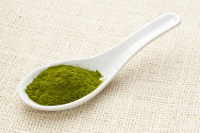Spirulina
Spirulina is a microscopic blue-green spiral algae that lives in an alkaline environment in water. It is rich in protein, vitamins, minerals and carotenoids. It contains nutrients such as B vitamins, vitamin E, manganese, zinc, copper and iron. It also contains essential fatty acids as well as phytochemicals.
 Where Does It Come From?
Where Does It Come From?
There are only 3 lakes (in China, Africa and Mexico) in the world that produce this spiral blue green algae naturally. It grows naturally in alkaline bodies of water where toxins are unable to grow, so contamination is limited. Most of it is commercially cultivated in ponds around the world.
What Is In It?
This spiral shaped blue green algae is a complete protein that contains all the essential amino acids. In fact, it is at least 62% protein. It is rich in:
- gamma linolenic acid (GLA) - an essential fatty acid that contributes to soft and shiny hair and skin.
- alpha linolenic acid (ALA)
- linolenic acid (LA)
- stearidonic acid
- eicosapentaenoic acid (EPA)
- docosaheaenoic acide (DHA)
- arachidonic acid (AA)
- B1, B2, B3, B6, B9, C, D, A and E
- potassium, calcium, chromium, copper, iron (as much iron as red meat), magnesium, manganese, phosphorous, selenium
- beta carotene
- zeaxanthin - the most important antioxidant in support of vision
- chlorophyll
- phycocyanin - stimulates the production of stem cells in our body
Benefits
This superfood has many benefits. It has anti viral properties and it is believed to boost the immune system. There have been both animal and human studies that have shown it to be a beneficial food.
Animal research has shown that it
- prevents heart damage associated with chemotherapy
- reduces the severity of strokes
- improves motor recovery after strokes
- reverses age related memory decline
- prevents and treats hay fever
Human research indicates that it
- corrects anemia
- helps lower blood pressure
- lowers total cholesterol
- increases HDL cholesterol
- lowers triglycerides
- lowers systolic and diastolic blood pressure
- increases levels of antioxidants
Dosage
Spirulina products are available in either dried or freeze-dried forms. You can find spirulina at your health food store or online at one of my favorite on-line stores, The Raw Food World.
It usually comes in very small green tablets that are very easy to swallow. It can be added to smoothies, salad, salad dressings and taken as a supplement. For adults, the standard dosage is 4-6 tablets daily (500 mg. each).





